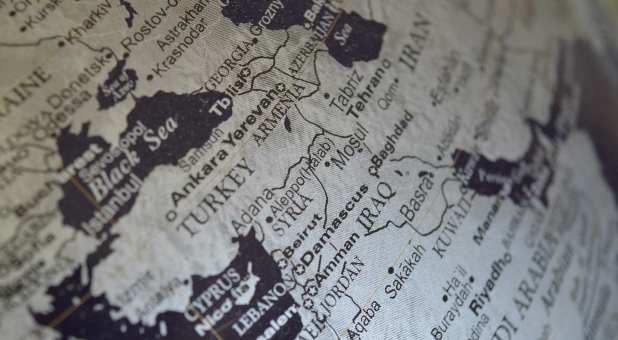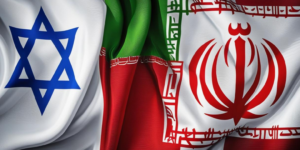Why Israel Must Consider Iran When Looking at Russia’s Invasion of Ukraine
Whether Russia’s invasion of Ukraine is short-term or indefinite, and whether it has additional expansionist intentions on other former Soviet republics, what’s happening in Ukraine has a broad global impact. What is certain is that the Russian invasion was unprovoked. Some have alleged war crimes against Russia. How it unfolds is anyone’s guess, but the repercussions will be felt far and wide.
From an Israeli perspective, one of the most serious issues is how Iran looks at and responds to these unfolding events. Will the ayatollahs be emboldened? Will they see the world’s response as weakness and an open door to create mischief of their own? Will they calculate the world powers balking on protecting Ukraine as an opportunity to attack Israel? Will they attack on their own or use their proxies in Syria, Lebanon, Gaza, Yemen and elsewhere?
Israel’s response has to be particularly judicious considering that Israel virtually shares a border with Russia, whose military controls much of Syria and is propping up the Assad regime there more than a decade after many counted Assad out. Israel and Russia have established good relations over the years, and a modus vivendi relating to Israel’s (alleged) military strikes on Iranian targets in Syria. While Russia has its own interests in Syria that are not aligned with anyone but Russia, it does not want Iran to get too strong there. So enabling, or at least not preventing, Israeli attacks on Iranian targets is a common interest. Even amid the conflict in Ukraine, Russia has declared it will not prevent Israel’s ability to engage Iran in Syria.
That’s one of the reasons Israel has not spoken out more harshly about Russian aggression or signed on to U.S. language that condemns Russia outright. Israel needs to have that access without ending up confronting Russian military directly in and above Syria, even if Israel is flying circles around Syria using Russian hardware. And Russia certainly does not want an escalation in Syria while engaged in Ukraine. Perhaps by not overtly condemning Russia, the Ukrainian president was able to suggest recently that Israel mediate between Russia and Ukraine.
Just before the Russian attack, it seemed likely that the U.S. and world powers (including Russia) were on course to sign a new nuclear agreement with the Iranians. Israeli Prime Minister Naftali Bennett called out the presumed terms of that agreement, citing that it was unacceptable and would enable Iran to acquire nuclear weapons in two and a half years. Bennett underscored that Israel was not a party to the presumed agreement and would not feel obliged by it.
If Iran is looking at the Russian invasion as a sign of weakness from the U.S. and the Western powers, which are not prepared to substantially step up and defend Ukraine, it’s reasonable that they won’t come to Israel’s defense either should Iran attack. This is important, and that’s Israel’s primary concern. In Israel, one hears over and over that we can only rely ourselves, which begs the question whether or not Israel might be preparing a preemptive strike against Iran, and when that might happen, especially while the world focuses on Ukraine, and oil and gas prices are as high as they are.
On the sidelines, there are a handful of Sunni Arab states that also view Iran as a possible existential threat and could partner with Israel in some way. These include Egypt and Jordan, which have long time peace agreements with Israel; the United Arab Emirates and Bahrain, which made peace with Israel and have established openly warm relations with Israel in the past two years, including a defense agreement signed with Bahrain, a quick flight from Iran and easy place to refuel Israeli F-35s. These two, along with the Saudis, have been victims of Iranian attacks in recent months, and a coalition of them together, unprecedented a decade ago, could actually take place if they all also feel that the U.S. and Western powers are not reliable.
There are many factors that can change daily, but the important thing is to look at the big picture and not only what’s happening on the ground in Ukraine, but how Russia fares, how the world responds and if bad players like Iran see this all as an opportunity. {eoa}
Jonathan Feldstein was born and educated in the U.S. and immigrated to Israel in 2004. He is married and the father of six. Throughout his life and career, he has been blessed by the calling to fellowship with Christian supporters of Israel and shares experiences of living as an Orthodox Jew in Israel. He is president of the Genesis 123 Foundation, which builds bridges between Jews and Christians, and writes regularly for a variety of prominent Christian and conservative websites. Inspiration from Zion Inspiration from Zion is the popular webinar series and podcast that he hosts. He can be reached at InspirationfromZion@gmail.com.
Read articles like this one and other Spirit-led content in our new platform, CHARISMA PLUS.




























































